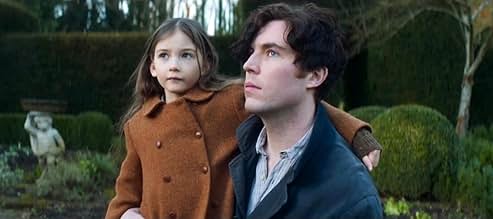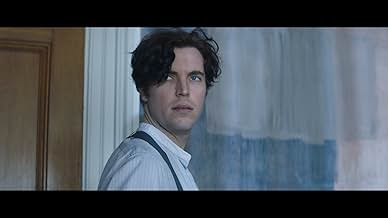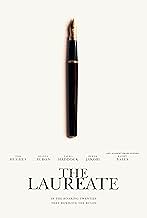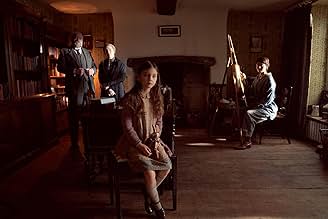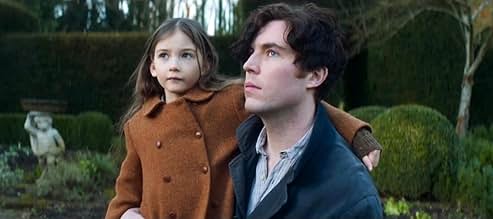मोहभंग के कगार पर एक विवाहित जोड़ा एक अजनबी को अपने रमणीय झोपड़ी में उनके साथ रहने की अनुमति देता है।मोहभंग के कगार पर एक विवाहित जोड़ा एक अजनबी को अपने रमणीय झोपड़ी में उनके साथ रहने की अनुमति देता है।मोहभंग के कगार पर एक विवाहित जोड़ा एक अजनबी को अपने रमणीय झोपड़ी में उनके साथ रहने की अनुमति देता है।
- पुरस्कार
- कुल 4 जीत
कहानी
क्या आपको पता है
- ट्रिवियाCaptain Robert von Ranke Graves (24 July 1895 - 7 December 1985) was an English poet, historical novelist and critic. His father was Alfred Perceval Graves, a celebrated Irish poet and figure in the Gaelic revival; they were both Celticists and students of Irish mythology. Robert Graves produced more than 140 works in his lifetime. His poems, his translations and innovative analysis of the Greek myths, his memoir of his early life-including his role in World War I-Good-Bye to All That (1929), and his speculative study of poetic inspiration The White Goddess have never been out of print. He is also a renowned short story writer, with stories such as "The Tenement" still being popular today.
फीचर्ड रिव्यू
I enjoyed the film much more than some of the reviews here because I think it was made for a general audience who would not know who Robert Graves was. It took the breakup of his marriage to emerge from PTSD and becomes a poet devoted to Laura Riding. The sets were amazing and I thought the performances were very good. As a person who has actually read many biographies on Robert Graves, attended the Graves society meetings, and have met his sons (by his 2nd wife) I can say all those events did indeed happen. I suspect Nunez actually watered down some events to make the characters more likeable. That must be the reason there is one child instead of four and Nancy is a bit softer.
Laura by all accounts was off her rocker and a completely polarizing person. I think the film actually waters this down for general audience effect. The most important theme I found interesting (which surprised me by all the accounts on the web and reviews) was that Robert was bisexual. That was not the case. Robert was raised by a puritanical mother and apart from her family was never in the company of women from the time he was five until after the war. He did have a schoolboy crush on a boy which was not physical and thought himself gay . During the War, he was friends with Sassoon, Owen etc. In fact, he fell in love with the nurse tending to him after his wounds and shortly afterwards with Nancy who he quickly married. So in his later years, he called himself a pseudo homosexual which is not a hybrid but rather as "not genuine or a sham" The fact that he married a woman caused a strain with Sassoon who believed Graves was homosexual. There was no record of bisexuality ever in Graves life so it is interesting this reworking of his history as he affairs with his female "Muses" throughout the rest of life is well known.
Back to the film, I think I knew what they were trying to do which was more about the breakup of a family in order to save oneself creatively more than just a telling of a great writer. There could have been more nuanced in the acting especially in the character of Nancy as a feminist who acts braves and makes this pact but slowly cracks as Riding takes over Graves' life and her own. At the end of the film, Graves sets out to write the opening lines of his seminal work Goodbye to All That and make the decision to leave England to pursue a life with Riding.
Overall a good introduction to the life of Graves but please read the biographies to get the full story!,
Laura by all accounts was off her rocker and a completely polarizing person. I think the film actually waters this down for general audience effect. The most important theme I found interesting (which surprised me by all the accounts on the web and reviews) was that Robert was bisexual. That was not the case. Robert was raised by a puritanical mother and apart from her family was never in the company of women from the time he was five until after the war. He did have a schoolboy crush on a boy which was not physical and thought himself gay . During the War, he was friends with Sassoon, Owen etc. In fact, he fell in love with the nurse tending to him after his wounds and shortly afterwards with Nancy who he quickly married. So in his later years, he called himself a pseudo homosexual which is not a hybrid but rather as "not genuine or a sham" The fact that he married a woman caused a strain with Sassoon who believed Graves was homosexual. There was no record of bisexuality ever in Graves life so it is interesting this reworking of his history as he affairs with his female "Muses" throughout the rest of life is well known.
Back to the film, I think I knew what they were trying to do which was more about the breakup of a family in order to save oneself creatively more than just a telling of a great writer. There could have been more nuanced in the acting especially in the character of Nancy as a feminist who acts braves and makes this pact but slowly cracks as Riding takes over Graves' life and her own. At the end of the film, Graves sets out to write the opening lines of his seminal work Goodbye to All That and make the decision to leave England to pursue a life with Riding.
Overall a good introduction to the life of Graves but please read the biographies to get the full story!,
- rtproducer-13219
- 7 फ़र॰ 2022
- परमालिंक
टॉप पसंद
रेटिंग देने के लिए साइन-इन करें और वैयक्तिकृत सुझावों के लिए वॉचलिस्ट करें
- How long is The Laureate?Alexa द्वारा संचालित
विवरण
बॉक्स ऑफ़िस
- दुनिया भर में सकल
- $2,192
- चलने की अवधि1 घंटा 44 मिनट
- रंग
इस पेज में योगदान दें
किसी बदलाव का सुझाव दें या अनुपलब्ध कॉन्टेंट जोड़ें





